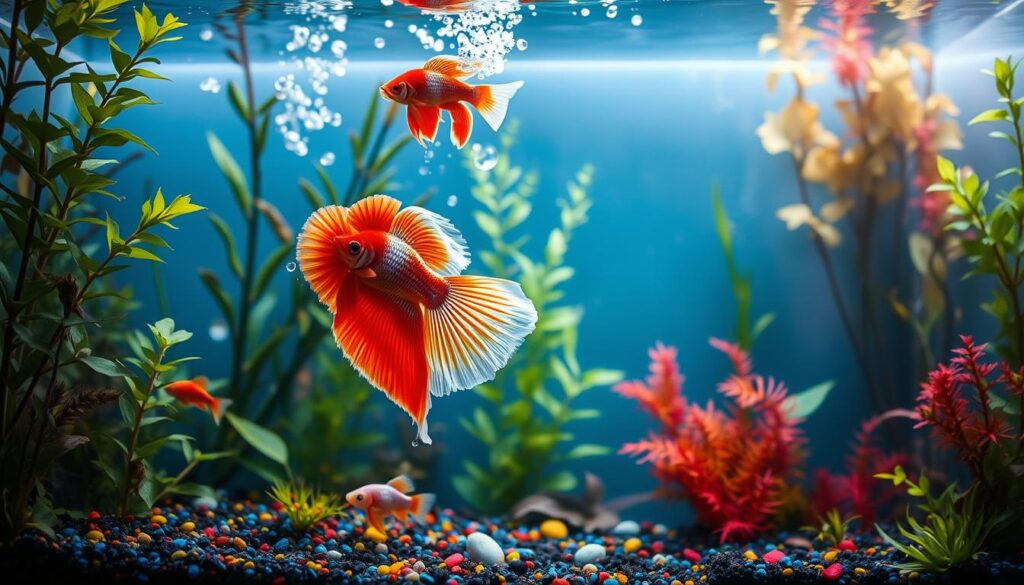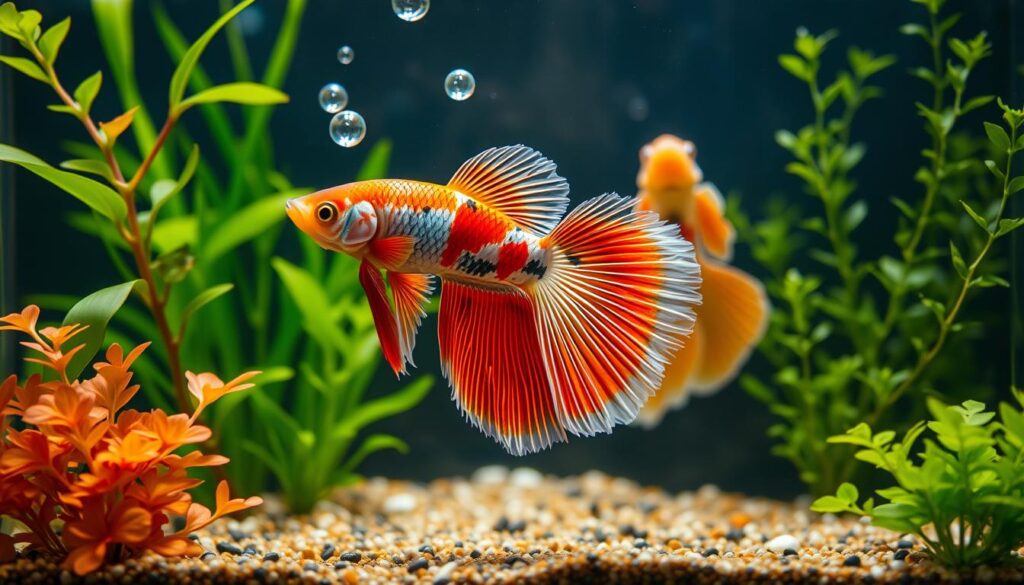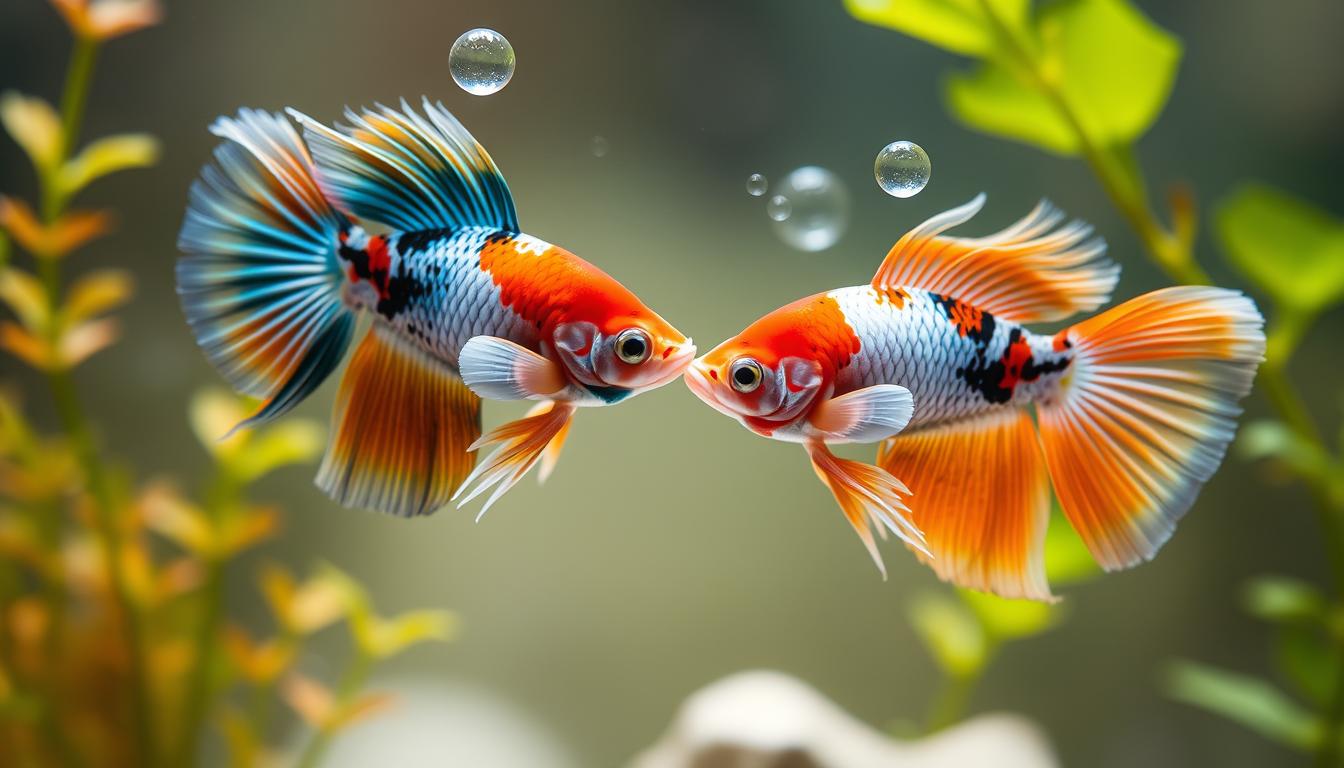Did you know male bettas get ready to breed at 4 to 6 months old? This shows how important good care is for breeding Koi betta fish. We’ll share tips and techniques for breeding these beautiful fish. With the right info, you can breed them successfully.
We’ll talk about getting ready to breed, caring for the young, and more. Our guide is for both new and experienced breeders. It will show you how to breed Koi bettas with the best techniques and care tips.
Introduction to Koi Betta Fish Breeding
We aim to give you a full guide on breeding Koi betta fish. You’ll learn how to breed them and care for them well. By the end, you’ll know how to breed Koi bettas and keep them healthy.
Key Takeaways
- Male bettas reach sexual maturity at approximately 4 to 6 months of age
- Optimal water temperature for bettas is between 76-82°F (24-28°C)
- Regular testing of water quality is necessary to maintain safe levels of ammonia, nitrites, and nitrates
- A nutritious diet includes high-quality pellets supplemented with live or frozen foods
- Proper water quality and a protein-rich diet are critical for promoting robust growth in young betta fry
- Koi betta fish breeding tips and betta fish breeding techniques are essential for successful breeding
- Koi betta fish care tips are crucial for providing the proper care and attention to your Koi bettas
Understanding Koi Betta Fish
Koi betta fish are known for their stunning color patterns and unique requirements. They are special when it comes to breeding betta fish for beginners. We will explore what makes them unique and how to create a great environment for them.
Choosing healthy fish is key for best practices for breeding koi bettas. Koi bettas are loved for their colors and patterns. They have unique traits like:
Click here to buy High-quality Betta Fish Food – boosts color, health & energy in every bite.
- Unique color patterns, including red, blue, and black
- Distinctive tail types, such as Halfmoon and Plakat
- Specific environmental requirements, including temperature and water quality
By knowing these traits and following best practices for breeding koi bettas, breeders can create a great home for their fish. They can also enjoy the joy of successful breeding.
| Characteristics | Description |
|---|---|
| Color Patterns | Red, blue, and black |
| Tail Types | Halfmoon, Plakat, and others |
| Environmental Requirements | Specific temperature and water quality ranges |
Preparing for Breeding
Getting ready for breeding is very important. You need to know about betta fish breeding FAQ. This includes picking healthy pairs and setting up the right place.
To have a good breeding, choosing healthy pairs is key. Look for bettas with bright colors and no sickness. A good tank is also important. It needs clean water, the right temperature, and enough space.
Selecting Healthy Breeding Pairs
Healthy pairs have bright colors and move a lot. They should not have any obvious problems. It’s also good to get bettas from trusted places.
Creating the Perfect Breeding Tank
The tank should be big, clean, and have the best water. Changing the water often and feeding them right is also key.
If you’re new to breeding betta fish, a FAQ can help. By following these tips and doing your homework, you can raise healthy fry. And you’ll have a great breeding experience.
Breeding Process Overview
Understanding how to breed koi bettas at home is key. The male betta starts by building a bubble nest. This can take hours.
After the nest is ready, the male will show off to attract the female. The female will show she’s ready by displaying vertical stripes.
If she likes the nest, mating can last up to 6 hours. The female will then lay her eggs in the nest. The male will fertilize them.
Spawning Rituals of Koi Bettas
The courtship of koi bettas is complex. The male does dances to attract the female. He flares his fins and vibrates his body.
Role of Males and Females
The male is important in breeding. He builds the nest and fertilizes the eggs. The female lays the eggs and gives them nutrients.
Signs of Successful Mating
After mating, the female lays eggs in the nest. The male then fertilizes them. If there are eggs in the nest and the male cares for them, mating was successful.
| Stage | Description | Duration |
|---|---|---|
| Courtship | Male betta builds bubble nest and courts female | 3-4 hours |
| Mating | Male and female mate, and female lays eggs in bubble nest | up to 6 hours |
| Incubation | Eggs incubate in bubble nest | 2-3 days |
By following these tips, you can breed koi bettas at home successfully.
Caring for Fry
After the spawning, taking care of the fry is very important. We give tips on koi betta fish care to keep them healthy. A good environment is key, with a separate tank and the right water.
For breeding koi bettas, planning is key. The tank should be at least 5 gallons. The water should be between 76°F and 82°F. Feed them small amounts 2-3 times a day. Use infusoria or fry food once they hatch.
Setting Up a Fry Tank
Setting up a fry tank needs careful thought. Think about water temperature, quality, and hiding spots. Make sure the tank is cycled before adding the fry.
First Foods for Betta Fry
Picking the right first food for betta fry is important. You can use infusoria or fry food. Don’t overfeed to avoid water quality problems.

Also Read Tangerine Koi Betta Fish: Stunning Aquarium Centerpieces
Monitoring and Maintaining Health
Watching the fry’s health is crucial. Look for signs of disease and keep the water clean. A high-protein diet helps them grow.
Some important tips for fry care include:
- Feed small amounts 2-3 times a day.
- Avoid overfeeding to prevent water quality issues.
- Monitor the health of the fry closely.
- Provide a suitable environment with hiding spots and proper water conditions.
| Age of Fry | Food Type | Feeding Frequency |
|---|---|---|
| 0-1 week | Infusoria | 2-3 times a day |
| 1-2 weeks | Commercially available fry food | 2-3 times a day |
| 2-3 weeks | Small pellets | 2-3 times a day |
Common Breeding Challenges
When breeding betta fish for beginners, knowing common challenges is key. Aggression, often seen in males, can cause stress and injury. To avoid this, give them lots of space and use visual barriers.
Raising healthy koi betta fry needs careful attention to their home. Keep the water right, feed them well, and don’t overcrowd the tank. Too many fish can make them sick and stressed.
- Make sure the breeding tank is big enough. Aim for at least 5 gallons for one male betta.
- Keep the water perfect, with the right temperature, pH, and nitrate levels. This helps them grow strong and healthy.
- Give them a diet that’s full of nutrients. This is good for both the adult bettas and the growing fry.
By knowing and fixing these common problems, you can breed betta fish for beginners successfully. And you’ll get to enjoy the joy of raising healthy koi betta fry.
Read Also Aquarium Salt for Betta Fin Rot: How to Use It Safely & Effectively
Advanced Breeding Techniques
Exploring koi betta fish breeding, we find advanced methods. These help create unique and stunning fish. Breeders use tips and techniques to pick the best traits and mix different varieties.
Selective breeding is key. It means picking pairs for certain traits like color or fin shape. This way, breeders can make new, exciting koi betta varieties. For example, they can breed for specific colors to get unique fish.
Hybridizing koi bettas with other varieties is another method. It mixes different betta species to create new fish. This brings new traits and increases genetic diversity, making high-quality fish.

To understand betta breeding, studying genetics is important. Breeders look at the genetic makeup of their fish. This helps them choose the best pairs and create new varieties. Some important genetic combinations include:
- Steel Blue (B1/B1) for a soft blue coloration
- Green (B+/B+) for rich green hues
- Turquoise (B+/B1) for blue-green coloration
Using these advanced techniques, breeders can make stunning koi bettas. These fish show off their unique traits and genetic diversity.
| Trait | Genetic Combination | Description |
|---|---|---|
| Steel Blue | B1/B1 | Soft blue coloration |
| Green | B+/B+ | Rich green hues |
| Turquoise | B+/B1 | Blue-green coloration |
Final Tips for Successful Breeding
As we near the end of our journey in breeding Koi bettas, it’s essential to remember that successful betta fish breeding tips are key to achieving our goals. Keeping records of our breeding pairs is crucial. This includes their lineage, health, and breeding history. It helps us identify patterns and make informed decisions for future breeding cycles.
Learning from each breeding cycle is also vital. By analyzing what worked and what didn’t, we can refine our techniques. This is important when breeding koi bettas in a home aquarium, where space and resources may be limited.
Benefits of Joining Breeding Communities
Joining betta fish breeding communities can provide valuable insights and support. These communities share knowledge, resources, and experiences. They help us stay up-to-date with the latest successful betta fish breeding tips. By connecting with other breeders, we can learn from their successes and challenges, improving our own breeding practices.
Creating a Breeding Plan
To ensure success in breeding koi bettas in a home aquarium, it’s crucial to create a breeding plan. This plan should include details on tank setup, water conditions, and breeding pair selection. By following a well-structured plan, we can minimize risks and maximize our chances of successful breeding.
Also Read Best Diet for Female Koi Betta Fish: Optimal Care
Equipment Essentials for Breeding
For breeding koi betta fish, the right equipment is key. We’ll show you what you need, like tanks and filters. Also, tools for keeping water right and testing kits. Follow these koi betta fish care tips to make a good home for your fish.
High-quality equipment is vital for your koi bettas’ health. Here are important things for best practices for breeding koi bettas:
- Recommended tank size: a minimum of 5 gallons for a single breeding pair
- Filtration system: capable of processing aquarium water three to five times an hour
- Temperature regulation: tools to maintain a temperature range of 74-82°F
- Testing kits: for monitoring water quality and making necessary adjustments

With the right gear and these tips, you can make a great home for your koi betta fish. This will help your breeding chances. Always put your fish’s health first. If you’re unsure, ask an experienced breeder for help.
| Equipment | Recommendation |
|---|---|
| Tank size | Minimum 5 gallons |
| Filtration system | Capable of processing 3-5 times an hour |
| Temperature regulation | Maintain 74-82°F |
Health Considerations for Breeders
When breeding betta fish, health is key. Knowing common betta diseases helps stop illness. Quarantine is important to treat health problems before breeding.
Preventative care is also crucial. This includes vaccinations and keeping water clean. These steps help your fish stay healthy. For example, changing water often and checking water quality can prevent diseases.
Health issues like fin rot, swim bladder disease, and fungal infections are common. Knowing these and how to prevent them is important. This way, you can raise healthy koi betta fry and enjoy breeding.
To keep your betta fish healthy, follow these tips:
* Check water quality often
* Feed them a balanced diet
* Don’t overcrowd the tank
* Quarantine new fish before adding them to the breeding tank
| Disease | Symptoms | Treatment |
|---|---|---|
| Fin Rot | Frayed or torn fins | Antibiotics and improved water quality |
| Swim Bladder Disease | Difficulty swimming or floating | Improved water quality and dietary changes |
| Fungal Infections | White or cotton-like growths | Antifungal medications and improved water quality |
By following these tips and knowing about health issues, you can create a healthy space for your betta fish. This makes breeding and raising koi betta fry rewarding.
Nutrition for Breeding Bettas
Nutrition is key for koi betta fish breeding. The right foods and supplements help a lot. A healthy betta is more likely to have successful spawns and healthy fry.
Bettas are meat-eaters and need lots of protein. Live or frozen foods like brine shrimp or bloodworms are great. But, don’t overfeed to keep the water clean and the fish healthy.
Best Foods for Breeding Bettas
Brine shrimp, bloodworms, and daphnia are top picks for breeding bettas. They give the fish the nutrients they need. Feed bettas 2 times a day or small meals all day.

Supplements to Enhance Health
Supplements can also help breeding bettas. Vitamin and mineral supplements boost their immune system. But, use them carefully and follow the instructions.
Feeding Schedules for Breeding Pairs
Having a feeding schedule is important for breeding bettas. Feed them 2-3 times a day with different foods. Here’s a sample schedule:
- Monday, Wednesday, Friday: Live or frozen brine shrimp
- Tuesday, Thursday: Bloodworms or daphnia
- Saturday, Sunday: Rest day or a small meal of pellets
By following these tips and techniques, breeders can have more success. They can raise healthy, thriving betta fish.
| Food Type | Frequency | Portion Size |
|---|---|---|
| Brine Shrimp | 3 times a week | 1-2 teaspoons |
| Bloodworms | 2 times a week | 1-2 teaspoons |
| Pellets | 1-2 times a week | 1/4 teaspoon |
Enriching the Breeding Environment
For successful betta fish breeding tips, a good breeding space is key. It should be fun and natural, like hunting and nesting. For breeding koi bettas in a home aquarium, make their home as natural as you can.
Think about adding plants and hiding spots. This makes your bettas feel safe and curious. Big anubias and Christmas moss are great for betta tanks.
Here are some tips for a better breeding space:
- Add plants and hiding spots to the aquarium
- Use bubble nests to help them nest
- Keep the water clear and the light cycle steady for better breeding
By using these successful betta fish breeding tips, you can make breeding more likely. Enjoy the fun of breeding koi bettas in a home aquarium.
| Environmental Enrichment | Benefits |
|---|---|
| Adding plants and hiding spots | Provides a sense of security, encourages exploration |
| Utilizing bubble nests | Encourages nesting behavior, increases breeding success |
| Enhancing visibility for breeding behavior | Allows for observation of natural behavior, increases breeding success |
Celebrating Your Breeding Success
Being a Koi Betta breeder is a journey with ups and downs. Once you’ve beaten the challenges and welcomed healthy fry, it’s time to celebrate. Your hard work and success should be recognized.
Sharing your success with others is very rewarding. It shows your dedication and skill.
Showcasing Your Koi Bettas
Be proud of your beautiful Koi Bettas. Think about entering them in local fish shows or online contests. It’s exciting to get feedback and meet other fans.
You might also want to start a social media account. This way, you can share your Koi Bettas with more people.
Sharing Your Journey in Online Communities
Joining online Betta fish breeding communities is great. You can meet others, share knowledge, and learn from experts. Your stories can inspire and help others grow.
Building Connections with Fellow Breeders
Connecting with other Koi Betta breeders is rewarding. Go to local fish club meetings, join online forums, or plan Betta breeding events. These connections can offer valuable advice, trading chances, and help with future projects.

